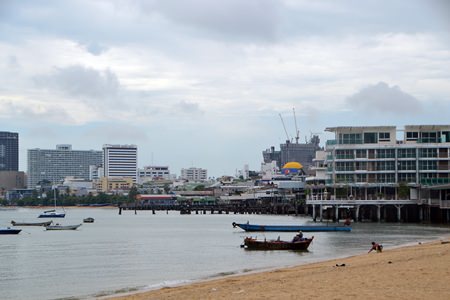The 101 buildings encroaching on royal land, a saga that dates back nearly 2 decades, are once again back in the city’s crosshairs. This time, however, only 12 Walking Street buildings have been ordered demolished for illegally extending their property.
Appeals could delay bulldozers for years
Twelve Walking Street buildings have been ordered demolished for illegally extending their property, the latest chapter in a saga dating back nearly two decades.
Deputy Mayor Ronakit Ekasingh clarified the situation regarding the go-go bars, discotheques and retail shophouses on the waterfront side of Walking Street at a meeting with building owners and city engineers May 13.
 The 101 buildings encroaching on royal land, a saga that dates back nearly 2 decades, are once again back in the city’s crosshairs. This time, however, only 12 Walking Street buildings have been ordered demolished for illegally extending their property.
The 101 buildings encroaching on royal land, a saga that dates back nearly 2 decades, are once again back in the city’s crosshairs. This time, however, only 12 Walking Street buildings have been ordered demolished for illegally extending their property.
He said that, in fact, the central government had determined that 101 buildings – basically the entire western side of Walking Street – has been built illegally on government land, but due to land-title issues, now officials can only move against 12 buildings that violated the original building permits.
A royal decree on land expropriation issued April 17 last year confirmed the findings of a 1998 Japan International Cooperation Agency that 101 waterside structures on Walking Street encroached upon royal land and should be razed.
Owners of those properties, including some of Pattaya’s wealthiest and politically connected families, stalled any move to demolish the buildings even as Walking Street grew into Pattaya’s best-known and most-lucrative tourist attraction. Now, some city leaders appear loathe to do anything that will jeopardize Pattaya’s tourism cash cow.
City Councilman Rattanachai Suthidechanai, who heads the Tourism and Culture Committee, said the demolition of half of Walking Street would affect Pattaya’s industry directly. While the city wants to improve its standard of tourist to attract more families, investors and businesses, the razing of half its red-light district would be a serious blow.
What became clear after this month’s meeting, however, is nothing is going to happen soon to Walking Street. Ronakit noted that even if the buildings are encroaching on government land, all the owners have legal land titles.
It will take time for the lengthy investigations and numerous administrative hearings to determine who issued those land titles, how they were issued, and whether they will be voided.
The case against 12 stakeholders, however, is less complicated. Those building owners were found to have modified and expanded their buildings beyond legal boundaries and have been ordered to demolish their structures.
While the buildings at issue were not specified, Pattaya previously has temporarily shutdown, fined and ordered the removal of building alterations at a prominent disco at the south end of Walking Street, as well as a long-running disco in the center of the street.
Here again, however, it’s unlikely anything will happen for some time.
Ronakit said all the affected building owners can appeal the demolition order within 30 days to the city. Pattaya will then forward the appeals to the Chonburi Appeals Consideration Committee. If that panel denies the appeals, owners can file a suit with the Central Administrative Court.
The Administrative Court, which can take years to rule, will have the final word on the case.
To get their appeals started, the building owners requested Pattaya provide its official certification that the buildings affected fall within an important tourist area and should be reserved.
Pattaya officials denied the request, saying the city, as plaintiff, was under no obligation to assist the property owners.
Ronakit also admitted that Pattaya has, for years, been derelict in upholding the findings of the 1998 study, but will now fully cooperate with the legal decision on the future of Walking Street.




